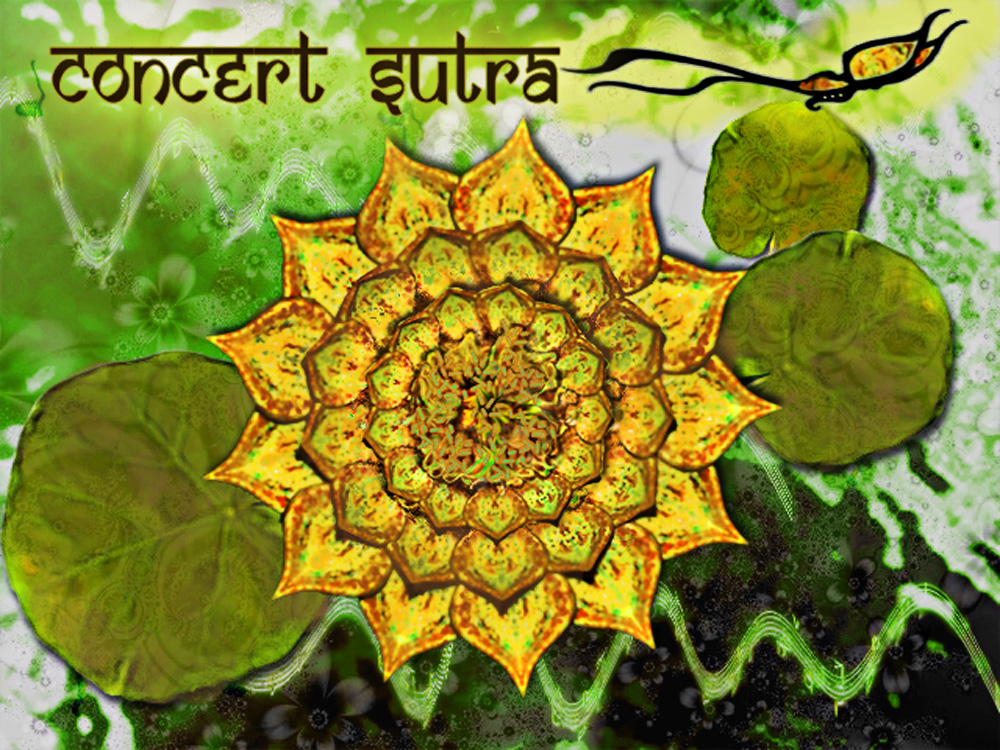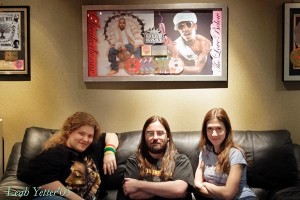Concert Sutra With Robert Hannon at Tree Sound
by terri sapp
Photographed by Leah Yetter
© Concert Sutra, All Rights Reserved
Oh…to be monkeying around in one of Atlanta’s most respected Recording Studios with Producer/Engineer extraordinaire, Robert Hannon!! This Grammy Award winner (for his work on Outkast’s “Hey Ya!”) has recorded and engineered many highly respected artists from Ludacris to Marvelous 3 to Bone Thugs ‘n’ Harmony to Snake Oil Medicine Show. Leah and I were able to spend some time at the largest, highest quality Studio in the Southeast United States. For some of Leah’s pictures of our time in the Studio, visit: http://www.concertsutra.com/cstree32005/. To check out more on Tree Sound Studios, go to: http://www.treesoundstudios.com/. Read on for an in depth interview with Robert Hannon.
Concert Sutra: Can you give us a little background to start out with on Tree Sound Studios and how it came to be so great?
Robert Hannon: (laughs) Well, it all started in Paul’s (Diaz, owner) basement…Paul’s parents’ basement, actually. With a four track tape recorder. He was doing bands in his parents’ basement, and he ended up…this wasn’t the first spot Tree was in…he had another place down the road. He built this one in ’97, and actually some of the first clients were TLC, Collective Soul, and R.E.M. Then, I came along.
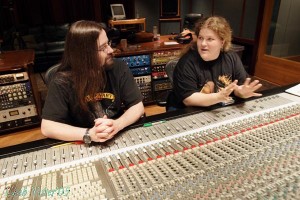 Concert Sutra: So, it started with a four-tack tape recorder!
Concert Sutra: So, it started with a four-tack tape recorder!
Robert Hannon: In his parents’ basement, which I am sure they were thrilled about!
Concert Sutra: So, when did you guys move over to this location?
Robert Hannon: I think he actually bought the building in ’95, but it took him like two years to build this A Room.
Concert Sutra: Wow! Did he just come in and say, “this is what I envision, this is what I want” then make it happen? Or did he have guidance? How do just make this (referring to the legendary Studio A)?
Robert Hannon: (laughing) Well, first, you need a lot of money! So you either gotta beg, borrow, or steal it! But, the old Studio was in the same building as AIM, Atlanta Institute of Music, it was a recording kind of school, and so he had some deal where the school would use his Studio for the students, and he was having some problems with the school, I guess, so he decided he wanted his own building that he owned, so he wouldn’t have to deal with, you know, landlords, or tenants…
Concert Sutra: Parents…
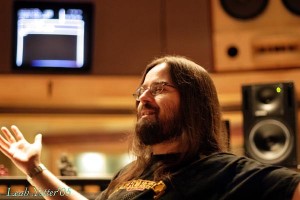 Robert Hannon: Yeah! The guys that designed this place basically charges a million bucks to design your studio.
Robert Hannon: Yeah! The guys that designed this place basically charges a million bucks to design your studio.
Concert Sutra: So, he did have a designer.
Robert Hannon: Oh, yeah, but he didn’t end up having to pay the guy a million bucks! He, along with the help of some of the other “studio people” in town that have been around here a lot longer, kind of convinced this dude to design the studio, because he (Paul) will build it how you design it. That’s why the designer charges a million bucks, because he doesn’t want to put his name on something, unless he KNOWS it is going to be build it right and not cut corners on his design. So, Paul got around that and got him to design this Studio, and so he built it!
Concert Sutra: Awesome!
Robert Hannon: (laughs) And now the bank owns it all!!! (laughs)
Concert Sutra: So, what about the mural? What’s the story on that?
Robert Hannon: Paul knew this couple, Amy and Patrick, that used to live here…they live in Asheville now…they’re friends…they do all the Mellow Mushroom art. If you have been in a Mellow Mushroom around Georgia, you’ve seen their painting. So, when we built out that side, you know, we had this big atrium…this giant blank wall! It was like, we gotta put something there! It took ‘em about six months to finish the whole thing.
Concert Sutra: It’s awesome! So, what do you think, in your opinion, are the top five biggest accomplishments of Tree Sound Studios (aside from this amazing building)?
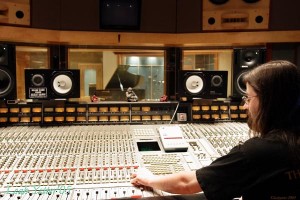 Robert Hannon: Number one, that we’re still open for business…(laughs)…given the current state of the industry where recording devices are so cheap now, and with computers people doing stuff in their bedrooms, it has really cut into the big studio business. They think they are saving money by not paying for a room like this, but the results speak for themselves.
Robert Hannon: Number one, that we’re still open for business…(laughs)…given the current state of the industry where recording devices are so cheap now, and with computers people doing stuff in their bedrooms, it has really cut into the big studio business. They think they are saving money by not paying for a room like this, but the results speak for themselves.
Concert Sutra: You can’t beat a room like this!
Robert Hannon: Also, just building up the client base that we have! Outkast, Goodie Mob, Ludacris, Nappy Roots, Beastie Boys, and on the “rock side,” Collective Soul, Sevendust, Live, Matchbox 20, you know, all the “platinums” on the walls…
Concert Sutra: I think if good hip hop when I think of Tree Sound Studios. There’s definitely evidence of that all over your walls! That’s definitely more than five major accomplishments! How did you end up at Tree Sound Studios?
Robert Hannon: I was living down in Orlando, Florida. I went to school down there for Engineering, and I didn’t want to live down there anymore, and didn’t want to move to New York or Miami or L.A. or Nashville, so Atlanta was a place I was familiar with. A buddy of mine that I went to school with down there had come back up to Atlanta about two weeks before I did, and he had been going to studios around town, and he told me about this place, so I came here and started as an intern. Cleaning toilets, cleaning the kitchen, taking out the trash, vacuuming…
Concert Sutra: The toilets around here are beautiful even! I have been eyeing that steam room in the bathroom across the hall! So, in your transition from interning to engineering, what was your first break?
Robert Hannon: Well, I got my first break to actually get in the studio and work on a sessions an assistant, because the assistant that was supposed to be on the session didn’t show up!
Concert Sutra: Praise Bob!
Robert Hannon: So, it’s like, one minute I’m cleaning a toilet, the next minute I’m hooking stuff up for a session. I guess the first session I got paid to assist on was with Marvelous 3, on the first Marvelous 3 record. They actually did both of their records here. I worked on both of them.
Concert Sutra: Then, from being an assistant to being THE MAN…tell me how that happened…
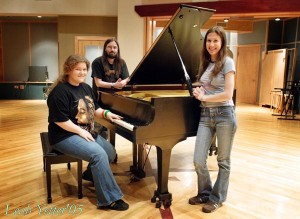 Robert Hannon: (laughing) I guess I had been assisting for about three months, and the Studio Manager at the time called me in the office and he just said, “Robert, can you engineer?” And I said, “Sure.” It was for Sam Salter, an R&B artist from Atlanta that was on LeFace. Sam came in to do some demos of some tracks, so that was kinda my “test.” The Studio Manager at the time, Jim, ended up leaving, and he was also Chief Engineer as well, so I guess once I demonstrated that I had some knowledge and wasn’t a dumbass. He was kinda planning I guess for his departure, and so he started “grooming” me for the task, I suppose.
Robert Hannon: (laughing) I guess I had been assisting for about three months, and the Studio Manager at the time called me in the office and he just said, “Robert, can you engineer?” And I said, “Sure.” It was for Sam Salter, an R&B artist from Atlanta that was on LeFace. Sam came in to do some demos of some tracks, so that was kinda my “test.” The Studio Manager at the time, Jim, ended up leaving, and he was also Chief Engineer as well, so I guess once I demonstrated that I had some knowledge and wasn’t a dumbass. He was kinda planning I guess for his departure, and so he started “grooming” me for the task, I suppose.
Concert Sutra: OK, well, you know it’s coming…
Robert Hannon: I didn’t do it, nobody saw me do it, nobody can prove anything…
Concert Sutra: Yes they can, actually, because you got a Grammy for it…Tell me about working with Andre 3000 a.k.a. “Yummylicious!” (laughs) How did you end up working with him?
Robert Hannon: Well, they do have a place of their own now here in town that they bought after their “Aquemini” record. So, their “Stankonia” album was actually named after the studio. The studio is actually called Stankonia. But it’s a one room facility, and since Speakerboxx/The Love Below was pretty much two solo records put together, plus they have other artists that they are developing, so Stankonia wasn’t available and Dre needed to finish his side of the record. He was only about half way done with it, and they were at Tree for their first three records, so he came over here and decided to stick here and finish the record. I was Chief Engineer at the time, and he needed an Engineer, so I got the job! He decided to stay here for a month and a half! But as far as what you see on stage, it’s not what you get off stage. He’s completely different.
Concert Sutra: What do you mean?
Robert Hannon: He’s very quiet, soft spoken, really reserved, you know, he’s got his stage persona. Yeah, he’s come in every day with a new toy, whether it was like some new synth module, or guitar pedal, or whatever, and spend hours going through sounds for a certain part or something. But it’s weird, because we did that record back in April and May of 2003, well, when he was here recording, and the record came out around October or whatever. But at first, “Hey Ya!” wasn’t going to be the first single. I can’t remember, it was going to be either “Happy Valentine’s Day” or “She Lives in my Lap.” But “Hey Ya!” ended up being the one that was released as a single. I don’t know how that came about, but I know when he was here working, he wasn’t thinking that “Hey Ya!” was going to be the one.
Concert Sutra: Isn’t it funny how that works out! You’ve also worked with some other of my favorites, Snake Oil Medicine Show. Tell me about some of this music that has just been released that you guys have been working on.
Robert Hannon: Actually, Andy Pond has a solo record coming out soon, too!
Concert Sutra: Did you work with him on that one, too?
Robert Hannon: Yeah. I mixed it and mastered it. He tracked it at another studio…
Concert Sutra: We can’t believe him! I love his banjo!
Robert Hannon: I met Snake Oil on their “Love” record, which was basically like a live show type thing. I don’t remember how they got hooked up with Paul. I wish I did. And, I didn’t do the “Bluegrasstafari” record, but that’s they only one I haven’t worked on. I either tracked or mixed all the others, including this newest, “We Make It Nice.”
Concert Sutra: So, those guys are crazy on stage, even off stage from what I can tell. At High Sierra this past year they were a walking carnival! Is it just mad when they are in the studio?
Robert Hannon: Them damn hippies! (all laugh) Nah…it’s not that crazy, but George is still George
Concert Sutra: We LOVE George!
Robert Hannon: They’re just so much about the good vibes and the love and there’s no stress or conflict. There might be some discussion or argument over something, but that’s pretty rare. It’s a lot of fun with them in the studio! 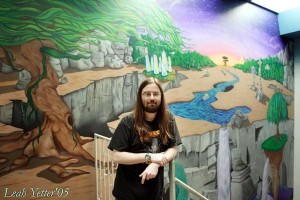 They’re all just incredible musicians, so that makes my job a lot easier! When musicians can actually play and sing and perform and write…We did this thing…George and Andy and Billy went down to Jamaica and tracked a bunch of stuff with the Overtakers, who were like, you know, Bob Marley era, but never got too far out of Jamaica, so not many here know about them. They’re some of the originators, innovators. Paul went and recorded it, and I mixed it back here. George keeps telling me I need to go to Jamaica. Yeah, they recorded this stuff on somebody’s front porch, or something. This one (referring to the Overtakers’ cd) is the Overtakers’ “Pon Scenic Isle,” but if you say Scenic Isle and put a little Jamaican accent on it, that’s how they say “Snake Oil.”
They’re all just incredible musicians, so that makes my job a lot easier! When musicians can actually play and sing and perform and write…We did this thing…George and Andy and Billy went down to Jamaica and tracked a bunch of stuff with the Overtakers, who were like, you know, Bob Marley era, but never got too far out of Jamaica, so not many here know about them. They’re some of the originators, innovators. Paul went and recorded it, and I mixed it back here. George keeps telling me I need to go to Jamaica. Yeah, they recorded this stuff on somebody’s front porch, or something. This one (referring to the Overtakers’ cd) is the Overtakers’ “Pon Scenic Isle,” but if you say Scenic Isle and put a little Jamaican accent on it, that’s how they say “Snake Oil.”
Concert Sutra: AAAWWW! Awesome! So, how is it different from working with bands like Snake Oil Medicine Show, to working with Ludacris and the DTP (Disturbing Tha Peace), and Nappy Roots and more hip hop groups? I know it must differ, even in the process of recording.
Robert Hannon: Yeah, the actual recording process is a lot different from hip-hop to rock or anything else. Technically, there’s stuff that’s different, that you approach differently as far as how you maybe record, or actually make certain things sound. Hip Hop sounds a certain way, you know, it’s all about the bass and the kick, and the vocals poppin,’ you know, everything’s very much the beat, the beat, the beat. Whereas Rock music, even though drums are a big part of it, has so much more going on than there is in a Hip Hop track. So, yeah, technically it’s a very different approach, but there’s not much difference as far as the artists in the studio. Like, how they behave, so to speak.
Concert Sutra: So, they all like to party in the studio is pretty much what you’re telling me.
Robert Hannon: Yeah! Well, there’s a keg of Sweetwater on tap in the kitchen…
Concert Sutra: Living or dead, who would you want to get into the studio with?
Robert Hannon: Pink Floyd. Or, the big three would be Floyd, Zeppelin, and the Beatles. Really, Beatles and Floyd or any of their associated members. That’s just stuff I grew up listening to and still listen to.
Concert Sutra: Actually, I was about to ask, who did you grow up listening to?
Robert Hannon: I listened to a lot of classic rock growing up on the radio. Then stuff they didn’t play on the radio like Kiss. I think it was Queen’s “Dragon Attack” and Gene Simmons are why I wanted to become a bass player. Cause I was a musician playing in bands for years before I actually got into recording anything. As I grew up, it became the mid-eighties, High School came around, and I did my share of the metal…there was “The Metal Years.”
Concert Sutra: What does THAT mean, because in the Eighties, that could mean anyone!
Robert Hannon: Iron Maiden, Black Sabbath, Judas Priest, you know, there was also some Motley Crew, and Ratt.
Concert Sutra: “Hair Bands!?”
Robert Hannon: I didn’t care for the cheese metal like Poison, Cinderella, and Winger, all those MTV kinda metal bands…they weren’t REALLY metal bands, they were pop bands. That music wasn’t METAL, not like Black Sabbath metal. Deep Purple is metal, not Poison. But, I did have to endure that when it was “the shit.” It sickens me that it’s now coming back!
Concert Sutra: Is it, you think?
Robert Hannon: Everything goes in twenty-year cycles. All you gotta do is think of what was popular twenty years ago, and it’s gonna be the next thing. In the 70’s, it was the 50’s. In the 80’s, it was the 60’s. In the 90’s, it was the 70’s. Now, the early 80’s synths stuff is starting to come back. And bands like the Darkness…
Concert Sutra: Next thing you know, we will already be throwing back to the 90’s!!!
Robert Hannon: In a lot of ways, the 90’s never left. As far as Rock goes, cause I don’t know what it was, but the grunge thing with Nirvana and all, kinda set a trend as far as rock radio goes that has lasted beyond the grunge era. I would say “grunge” ended in 1994, which was when Soundgarden’s Superunknown came out with “Black Hole Sun,” which is probably the pinnacle of their career. After that, of course, Kurt killed himself or was killed or…
Concert Sutra and Robert Hannon: Whatever happened there!
Robert Hannon: And Alice in Chains pretty much stopped playing, because, you know, whatever. Then Stone Temple Pilots came along, and even though they got unfairly compared to Pearl Jam, because of one song. They put out one this one song, and all of a sudden he is being compared to Eddie Vedder. But then you had, you know, all the innovators going away, and then all these imitators for like, the next five years, like Bush…and…
Concert Sutra: Creed…(evil laugh)
Robert Hannon: So, for me, the mid-90’s kind of sucked as far as music went. Then, come the late 90’s all this new metal came in. The rap-rock thing started to get hot again, so to speak. You have your Incubus’s, and, uh, what’s their names…
Concert Sutra: (whispers) 311…
Robert Hannon: Yeah, but 311’s been around awhile.
Concert Sutra: So, what about your parents, what did they listen to when you were growing up?
Robert Hannon: It’s kind of strange, I guess they stopped really playing music around the house when they had me and my brother. I don’t know, because I remember the stereo being there, and I remember finding all my Dad’s old records, but they never really just played music around the house. My Dad played piano, so he would play piano. They’re children of the fifties. Elvis for my Mom. You know, the do wop kind of thing. My Dad was really into Jazz and Big Band kind of stuff. You know, they grew up in the forties and the fifties.
Concert Sutra: Glenn Miller fan?
Robert Hannon: Exactly.
Concert Sutra: So, you had an early taste of the piano!
Robert Hannon: Exactly.
Concert Sutra: Do you have a favorite band or musician right now? What’s hot, Robert?
Robert Hannon: What’s HOT ‘s what I’m working on!! That’s what’s HOT!! Really, I’m always working, so pretty much whatever I’m working on is what’s in my car stereo. I listen to the radio. I flip the station to see what’s going on, but right now I’m hard pressed to name a current band that I really like. I don’t know what to think about some of this stuff like the Hives, and Jett, and that kind of stuff. They rip off so many…you can either call them influences or you can call it rippin it off. Then, there’s the Donnas, who is clearly AC/DC meets Cheap Trick, but chicks.
Concert Sutra: I love the Donnas.
Robert Hannon: I am not saying it’s a bad thing. I like the influences they draw from. Some of this stuff is just a little too much…like…
Concert Sutra: Walk the line…
Robert Hannon: It’s a fine line. Like they said on Spinal Tap, “It’s a very fine line between stupid and cleva.” (laughs)
Concert Sutra: How do you go about getting into different “modes” for recording and making the records that you work on?
Robert Hannon: Well, you know, there are your bands and artists that like certain chemical enhancements, I suppose you could say. For me, though, I’m at the point where I can kind of work on stuff I wanna work on, because I like the artist or like the music, but sometimes there’s also being professional and even if you don’t really care for it you gotta putcha thing down…But like to, I mean if you got the time before the project to get to kind of know the people before you get in the room and start putting stuff on tape, that helps.
Concert Sutra: One of your latest project is about to be released in the beginning of April, and we’re all real excited about it.
Robert Hannon: The record’s done. At the time that this interview is being done, it’s being pressed as we speak.
Concert Sutra: So, this is it, right? (picking up Robert’s copy, laughing the evil laugh) I love the “Tori Mix” you did on the piano. I love it when you isolate the tracks!
Robert Hannon: I think people will be pleased.
Concert Sutra: This place is amazing, and I think that anyone who records here must get the best possible result…
Robert Hannon: Not only that, but I have to remind some of these bands, like I did with P Groove, is that you can’t approach this like it’s a set list for a show. You’re in the studio making a record, which means you have license, as far as I’m concerned, to go beyond what you can do live. I think is SHOULD go beyond, otherwise it’s just a live record. The studio’s where you can do magic!
Concert Sutra: Magic in Studio A!! So, what are you working on now, Robert?
Robert Hannon: Nappy Roots.
Concert Sutra: So, their putting together a new album. We like that. I saw that you guys worked on their last one, “Chicken…”
Robert Hannon: “Watermelon, Chicken, and Grits.”
Concert Sutra: There you go! I saw them on that tour! They’re a lot of fun! I’ll bet their a lot of fun in the studio.
Robert Hannon: Yeah! But just like anytime you are dealing with a band with six members, it can be…
Concert Sutra: A task?
Robert Hannon: That’s a lot of people to please! Who all have almost an equally valid say in everything. But, yeah, we’re mixing some new tracks for them. Those guys, though, it’s so easy to work on material, cause you can get your m-box (?) and a laptop and microphone and you can lay down raps anywhere. So, they’re like always working on stuff. That’s one thing that I do notice is that Hip-Hop people seem generate a lot more material. Going back to your other question of different approaches, with Hip-Hop, one guy can take the beat and go work on a rap or something, whereas, when you’re working on a song in the setting of a band…Well, in Hip-Hop, one guy can create an entire track that’s everything…the drums, any instrumentation and whatnot, whereas with a band, you know, you write a song on guitar, then you gotta go get your bass player, then your drummer and singer, and get them all together to work out parts…if you’re Democratic like that…there are bands where there’s one person who writes the songs, pretty much it’s not really a band…
Concert Sutra: Like a Billy Corgan type thing.
Robert Hannon: Yeah, Smashing Pumpkins was all Billy Corgan!
Concert Sutra: I heard you have a trip to New York coming up soon, what do you have going on in New York?
Robert Hannon: I’m going to record some Levon Helm, the lead singer of the band “the Band.”
Concert Sutra: I love them! They played with Joni Mitchell some back in the day!
Robert Hannon: Well, you know they got their name…they call themselves the band, because they were Bob Dylan’s band. when he went electric. They were “the band” that backed up Dylan when he went electric!
Concert Sutra: They’ve been “the band” for a lot of cool artists, evidently.
Robert Hannon: Yeah, Levon played on a few track on the last Norah Jones record. He’s out doing stuff with other people. He’s got his place up in Woodstock, and so once a month, you never know who’s going to show up, people get together and jam. So, Paul and I are going to go up and record some stuff with them. You never know how’s going to show! I mean, “the Band” is the band Eric Clapton wanted to be in! He’s on record as saying that he wanted to be in “the Band.”
Concert Sutra: You’ll have to update me when you get back. So, what kind of advice would you give to an “up and coming” bands, in other words broke bands that haven’t made it yet, who are looking to be in such a cool and stacked studio like this, working with talent like you guys!
Robert Hannon: As far as actually coming in to record, you gotta have your shit together. Especially if you’re on NO budget. What I mean by have your shit together, like have your songs all worked out. Know what you want to do beforehand. But, there are so many things you need…I say this term half ironically…you need honest management. In the sense that you don’t get your brother to go manage you! You don’t get your cousin! You need an objective member who can have an outside opinion, because a lot of bands…you know, it’s your shit, it’s your baby, and there is such a thing as being too close to something…to see the forest for the trees kind of stuff. Mainly, though, just practice, practice, practice. Rehearse together. And if you have the money, anyone can book the studio. You don’t have to be a signed band. Booking the studio is one thing, though, it’s what you do with that time that really counts. And being productive, but that’s where I come in.
Concert Sutra: How do people get hooked up with you, though?
Robert Hannon: It’s the whole network thing. Somebody who knows somebody who knows somebody who says, hey, check out this band. There’s no one answer to that one.
